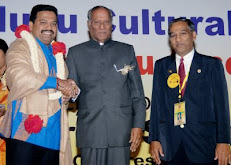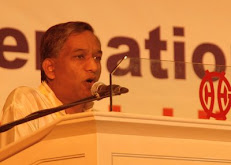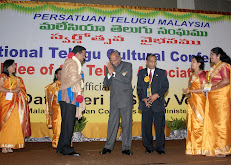SPEECH BY THE PRESIDENT OF INDIA, SHRI PRANAB MUKHERJEE AT THE FOURTH WORLD TELUGU CONFERENCE
Tirupati, Andhra Pradesh: 27-12-2012
It gives me great pleasure to attend the fourth World Telugu Conference and address an audience comprising eminent personalities from Telugu language and literature.
2. I am happy to note that the Government of Andhra Pradesh, through this Conference is making a comprehensive attempt at promoting Telugu language and literature. I understand that exposition of books, conduct of cultural programmes, convening of seminars and publication of special magazines form part of the activities being organized in connection with the Conference.
3. Telugu is one of the oldest classical languages of India. The word 'Telugu' was probably derived from trilinga, or Trilinga Desa, "the country of the three lingas", as according to legend, Lord Shiva descended as linga on three mountains namely, Kaleswara, Srisaila and Bhimeswara, which dots the Telugu region. Linguistic experts believe that Telugu was split from Proto-Dravidian languages between 1500 to 1000 BC. Inscriptions dating back to 400 BC, containing Telugu words, have been discovered in Guntur district of Andhra Pradesh. Despite the vast passage of time, the language has been successful in maintaining its basic character, and at the same time, evolving as a modern language.
4. The oldest works of Telugu literature are distinguished by their treatment of religious subjects. Between the Eleventh and Fourteenth Century of the current era, Nannaya, Tikkana and Errana, the poets known as the Trinity of Telugu Literature, composed the Andhra Mahabharatam. Telugu literature probably began to take shape with the composition of this great epic in Telugu. In the Thirteenth century, RanganathaRamayanam by Gonabudda Reddy was a pioneering work in Telugu on the theme of Ramayana. This great piece of literary work has now become integral to the Telugu culture.
5. Telugu has rich literary and grammatical traditions. Various forms of literature abound in the Telugu language, such as Prabandhams, which are stories written in verse form. Telugu literature has also resorted to a unique form of verse called Champu, which is a beautiful mixture of prose and poetry. To make Telugu literature more comprehensible to the masses and draw more admirers to the language, Dwipadas, or couplets, and Satakas, or hundred verses, came to be written. These include the Dasarathi Sataka and Vemana Sataka. Telugu grammar owes much to Paravastu Chinnayya Soori, who undertook extensive research on the grammar of the language and wrote Baala Vyakaranamu in the 19th century.
6. The Sixteenth and Seventeenth centuries are considered the golden age of Telugu literature. The first original poetic novel in Telugu literature, Kala Purnodayam, was written by Pingaliu Soorana, who was a pioneer in Telugu classical poetry. Krishna Deva Raya's Amuktha Malyadha, which blended the eternal and the temporal in a grand poetic style while describing an interesting tale, is considered a Maha Kavya, besides Peddhana's Manu Charithra.
7. The modern trend in Telugu literature began in the Nineteenth century, marked by several influential writers. Gurajada Venkata Appa Rao, considered the father of modern Telugu literature, adhered to a poetic style that was pure, lucid, vivacious and clear. He wrote Kanya Sulkam, which is considered a landmark play for its clear message of social reform. Another Telugu novel dedicated to the cause of social emancipation is Mala Palli by Unnava Lakshmi Narayana, a freedom fighter, who also fought against untouchability.
8. The literary movement in Telugu has continued with the same vigour in the post-Independence era. Several reputed writers have contributed to the growth and enrichment of this language. Viswanatha Satyanarayana, a versatile writer and author of more than 100 works, was bestowed with the Jnanpith Award in 1970 for his popular literary work, Ramayana Kalpa Vriksham. Dr. C. Narayana Reddy received the Jnanpith Award in 1988 for Viswambara.
Ladies and Gentlemen,
9. Four Indian languages namely Tamil, Sanskrit, Telugu and Kannada have been classified as classical languages in India. The Government of India created a category of 'classical languages' in 2004 with strict entry criteria. Languages meeting parameters such as antiquity of 1500 to 2000 years of its early texts or recorded history, body of ancient literature or texts considered a valuable heritage by generations of speakers and original literary tradition, not borrowed from another language have been made eligible for being classified as classical. Telugu language, with its credentials of a long surviving rich cultural heritage, was declared a classical language in India in 2008.
10. Telugu is today spoken in several parts of the country such as Pondicherry, Tamil Nadu and Karnataka, besides Andhra Pradesh. Its reach also extends beyond the shores of the country. Telugu-speaking Indian diaspora are present in significant numbers in the USA, the UK, Australia, New Zealand, Canada, Malaysia, Singapore, Mauritius, and South Africa.
11. It is important that the antiquity of Telugu language and civilization must be further explored. Having declared Telugu a classical language, it our responsibility to make every effort for its healthy growth and development so that posterity can benefit from the vast knowledge and ideas that rest within this language.
12. There is a need to have concrete plans for creating awareness about Telugu language and literature among today's youth. Steps must be taken to consolidate all research works on Telugu history undertaken so far and to identify and encourage new research projects. The use of Telugu in public administration and education should also be popularized.
13. Languages are not merely a means of communication. Our languages and literature are our heritage. They define and reflect the roots of our society. The promotion of literature cannot take place on the basis of Government support alone. I urge all stakeholders to contribute meaningfully towards preserving, encouraging and promoting Indian languages and literature.
14. There is no dearth of creativity and talent in Indian languages. While Indian writing in English has excited the world, we need to create platforms to provide greater exposure to Indian languages so that the creativity embedded in Indian literature is spread across the world.
15. The fourth World Telugu Conference is an opportunity for the eminent personalities, poets, writers, intellectuals and artists gathered here to give a new dimension and vision to the Telugu language. I am told that this Conference is being held in Andhra Pradesh after a long gap of 37 years. It would be useful to hold such conferences more frequently. I am sure that ideas and action points that emerge from this Conference will be examined by the State Government and measures undertaken to translate them into reality. I offer my best wishes to the large number of Telugu speakers who have assembled here for this important cause.
16. I wish the Conference a grand success.
Thank you.
Jai Hind!















.jpg)
.jpg)
.jpg)
.jpg)
.jpg)

